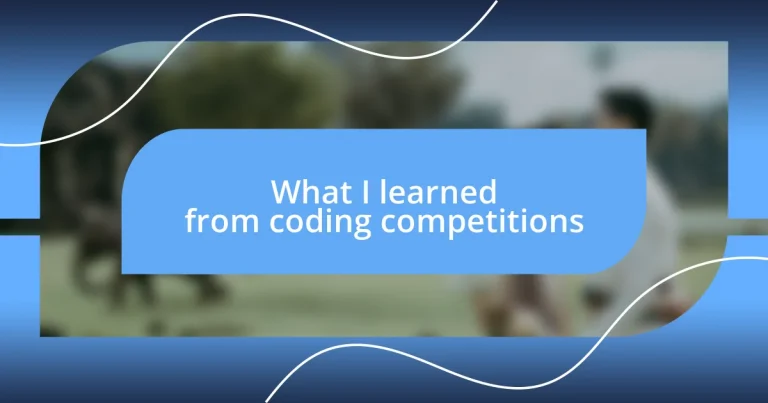Key takeaways:
- Coding competitions enhance problem-solving skills and teamwork, showing how collaboration can lead to breakthroughs.
- Participants develop essential skills such as resilience, adaptability, and critical thinking, which are valuable in both coding and everyday life.
- Effective practice strategies include setting achievable goals, incorporating timed challenges, and reflecting on solutions to deepen understanding and maintain motivation.
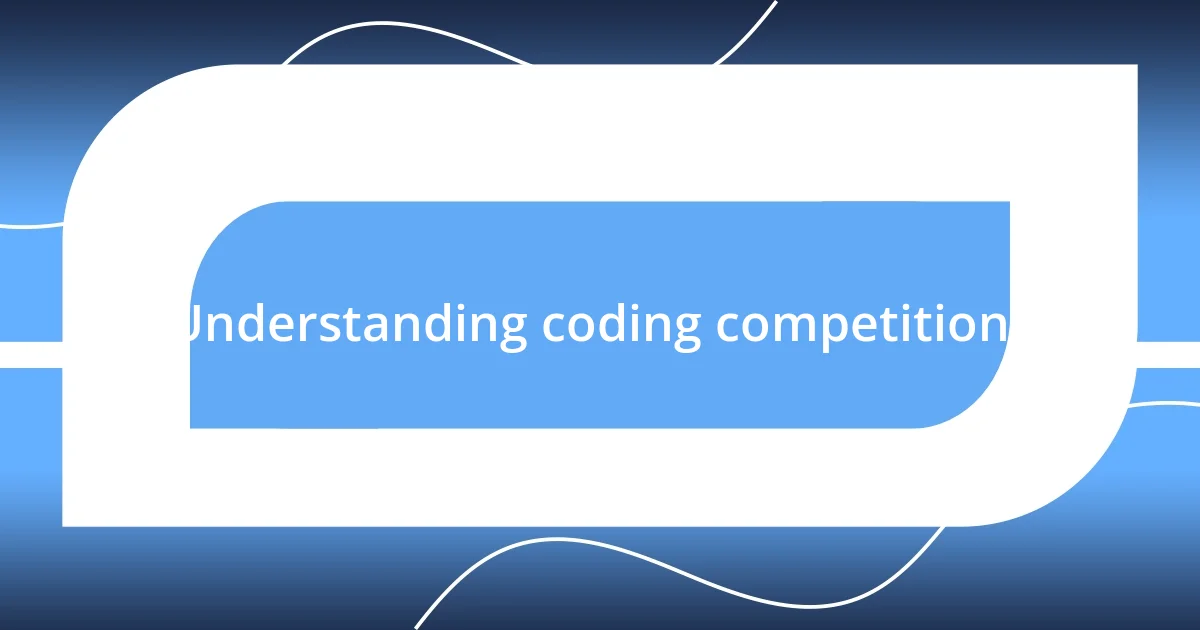
Understanding coding competitions
Coding competitions are a unique blend of creativity and logic, where problem-solving meets adrenaline. I remember my first competition vividly; the atmosphere was charged with excitement, the clock ticking away while I frantically typed out solutions. I often wonder, how can such a high-stakes environment push us to think differently about algorithms and data structures?
During these competitions, I’ve seen how the pressure can unlock latent problem-solving skills. One moment in particular stands out: I was stuck on a problem that felt insurmountable, but taking a deep breath and stepping back allowed me to approach it from a new angle. Isn’t it fascinating how sometimes, the simplest changes in perspective can lead to breakthrough moments?
It’s also intriguing how coding competitions can shape your understanding of teamwork and collaboration. In one of my experiences, we had just minutes left, and our team had to pivot from individual strategies to a collective approach. The thrill of coming together in those final moments taught me that sometimes, collaboration is the key to unlocking potential, don’t you agree?
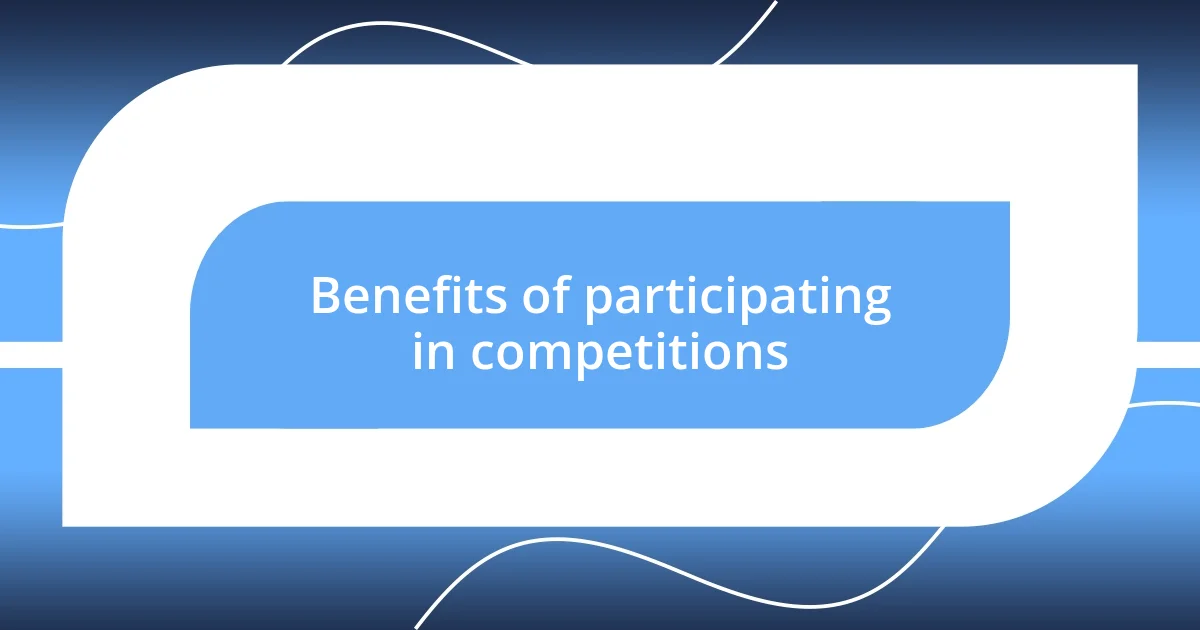
Benefits of participating in competitions
Participating in coding competitions offers a myriad of benefits that extend far beyond simply honing your technical skills. I’ve found that these events foster not only personal growth but also a stronger sense of community among participants. I recall a time when I was networking during a break; a casual conversation with another competitor led to a mentoring relationship that has enriched my coding journey immensely. Engaging with peers in high-pressure environments pushes you to share knowledge and learn from diverse perspectives, creating a vibrant learning atmosphere.
Here are some of the benefits I’ve gleaned from my competition experiences:
- Problem-Solving Skills: You become adept at tackling complex challenges with creative solutions.
- Time Management: The ticking clock compels you to allocate time wisely, preparing you for real-world project deadlines.
- Teamwork: Learning to collaborate under pressure enhances your ability to work effectively with others.
- Networking: Building connections with like-minded individuals opens doors to opportunities within the tech industry.
- Boosted Confidence: Conquering difficult problems and contributing to team success instills a sense of accomplishment that carries over to other areas of life.
Reflecting on my own journey, I often think about how each competition nudged me out of my comfort zone. It’s not merely about coding; it’s about facing fear and emerging stronger. For me, the thrill of visualizing my progress and celebrating minor victories fuels a passion that lasts long after the competition ends.
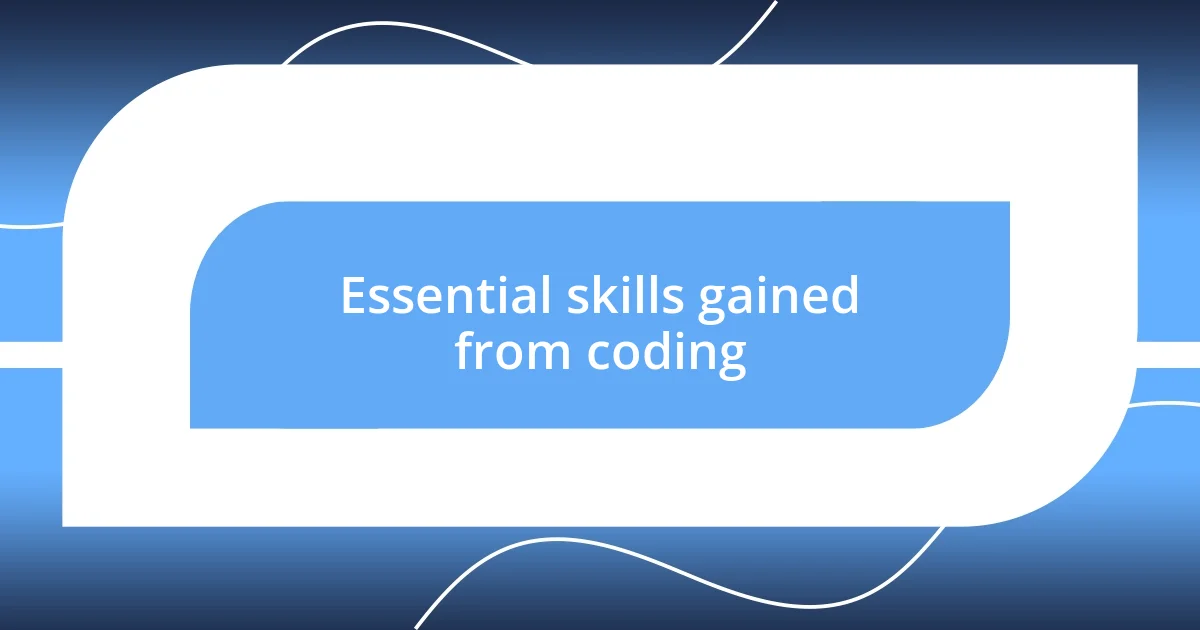
Essential skills gained from coding
Diving deeper into the essential skills gained from coding competitions, one standout quality is resilience. During one particularly tough challenge where I was stuck for what felt like ages, I nearly gave up. But instead of surrendering, I rallied my focus and tried a different approach. What a rewarding moment it was when my solution finally worked! This experience taught me that persistence often pays off, and I’ve carried that lesson not just into coding but into all aspects of my life.
Another skill that swiftly develops in the heat of competition is adaptability. I vividly remember a competition where the problem set contained unexpected twists that required rapid shifts in strategy. It was enlightening to realize how quickly I could pivot when faced with new information. This adaptability isn’t just useful in coding; it mirrors the dynamic nature of the tech industry where change is constant. Aren’t those skills invaluable for our careers and personal growth?
It’s also fascinating how competitions can help refine critical thinking. With each problem, I found myself dissecting what the question truly asked, breaking it down into manageable parts. That attention to detail has since improved my coding efficiency dramatically. My brain now runs to analyze rather than just react! Don’t you think this analytical mindset is something we all should cultivate, especially in today’s complex world?
| Skill | Description |
|---|---|
| Resilience | Developing the ability to persevere through challenges and setbacks. |
| Adaptability | Enhancing responsiveness to unexpected changes and needs. |
| Critical Thinking | Improving problem-analysis and solution-development abilities. |
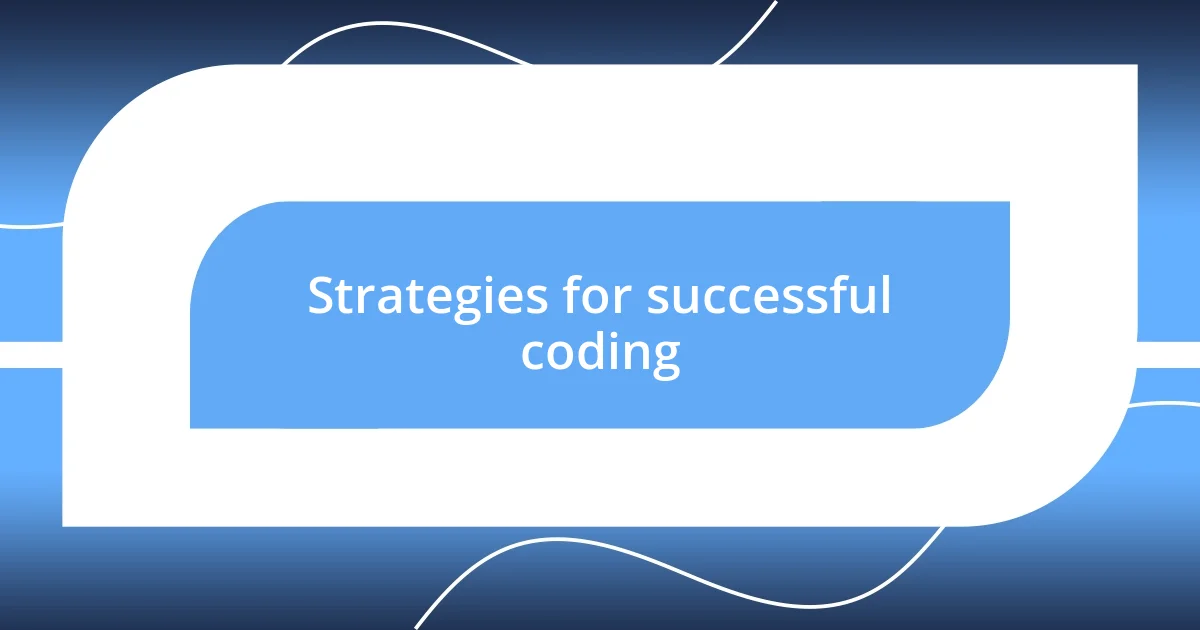
Strategies for successful coding
When it comes to strategies for successful coding in competitions, having a structured approach can make all the difference. I remember my early days when I jumped into competitions without a plan; it was chaotic! Now, I focus first on reading all the problems thoroughly, which helps me prioritize the easier challenges. Knowing where to direct my attention not only boosts my confidence but often leads to quick wins that can bolster my score.
Time management is another critical strategy I’ve learned through experience. During one intense competition, I started solving problems without a clear timeline in mind and ended up rushing toward the end. From that moment on, I began allocating specific time slots for each problem, allowing for buffer time at the end. This not only helped in completing more problems but also reduced that panicked feeling that can cloud judgment. Why put yourself in a position to stress when a well-timed plan can ease the pressure?
Lastly, I’ve discovered the value of methodical debugging. In one particularly frustrating round, I spent ages stuck on a code snippet. Instead of throwing my hands in the air, I learned to systematically break down my code and test each section. The relief when I finally spotted the error was phenomenal! This strategy instilled in me a patient and analytical mindset that continues to serve me well. Don’t you think that debugging is a skill we should all cherish, especially when we realize that mistakes are just stepping stones to mastery?
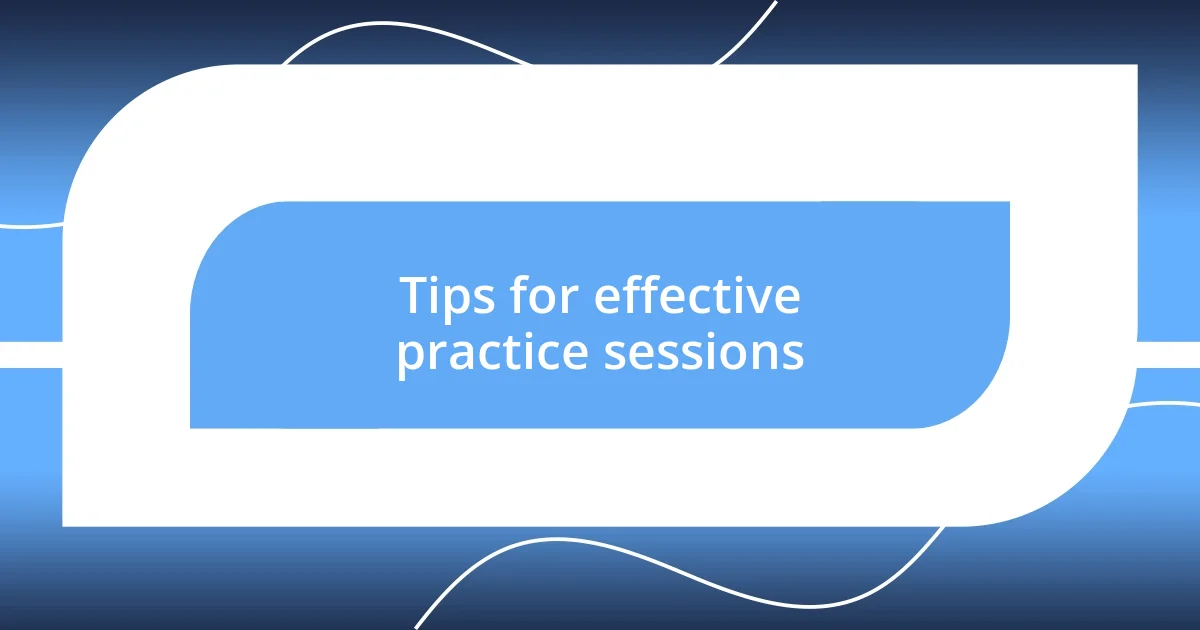
Tips for effective practice sessions
To make the most of your practice sessions, I find that setting clear, achievable goals is essential. I remember one session where I aimed to solve just two problems but ended up tackling five—some were too ambitious! Keeping my goals modest helps me maintain focus and allows for a sense of accomplishment as I check items off my list. Have you ever felt overwhelmed by your own ambitions? Simplifying my targets really brought clarity to my practice.
Incorporating timed challenges is another technique I’ve found beneficial. During one practice session, I set a timer for 30 minutes to solve a particular problem type. That urgency pushed me to think faster and more critically than I would in a relaxed setting. It was tough, but the adrenaline made the experience exhilarating! Can you imagine the kind of progress you could make by simulating competition conditions?
I also emphasize the importance of reviewing your solutions after a session. Initially, I would tackle problems and just move on, but I’ve learned that reflecting on what went well—and what didn’t—truly deepens your understanding. One time, I revisited a problem I thought I had mastered, and I was shocked by how many easy tricks I had overlooked. This habit has not just solidified my knowledge but opened my eyes to new strategies. Isn’t it interesting how much we can learn from simply hitting the pause button?
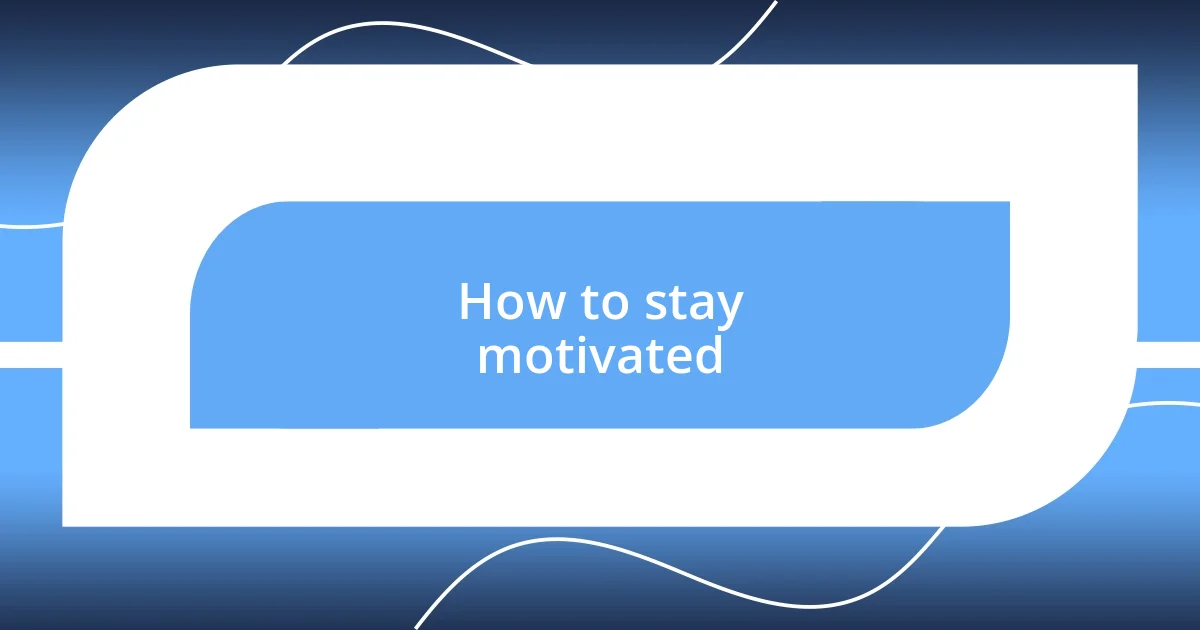
How to stay motivated
Staying motivated during coding competitions can be quite challenging, and I’ve learned a few strategies that really help. When I feel the competition pressure rising, I remind myself of my long-term goals and why I started this journey. One particular time, during a particularly tough competition, I kept thinking about the skills I was building, not just the short-term results. Shifting my focus like that kept my spirits up. Have you ever found that remembering your “why” reignites your passion?
Another approach that has fueled my motivation is celebrating small wins along the way. I vividly remember completing a challenging problem and feeling like I had just conquered Mount Everest! Moments like that deserve recognition. It’s not just about the final outcome, but those small victories that keep you energized. How do you recognize your achievements, even the tiny ones?
Lastly, I engage with a community of fellow coders, and it’s been a game-changer for my motivation. Sharing struggles and successes makes me feel less isolated. I recall chatting with a friend after a disappointing round, and their encouragement made me realize that setbacks are just a part of growth. Connecting with others who understand the highs and lows can provide that essential boost when you need it most. Have you experienced the power of community support in your own coding journey?












